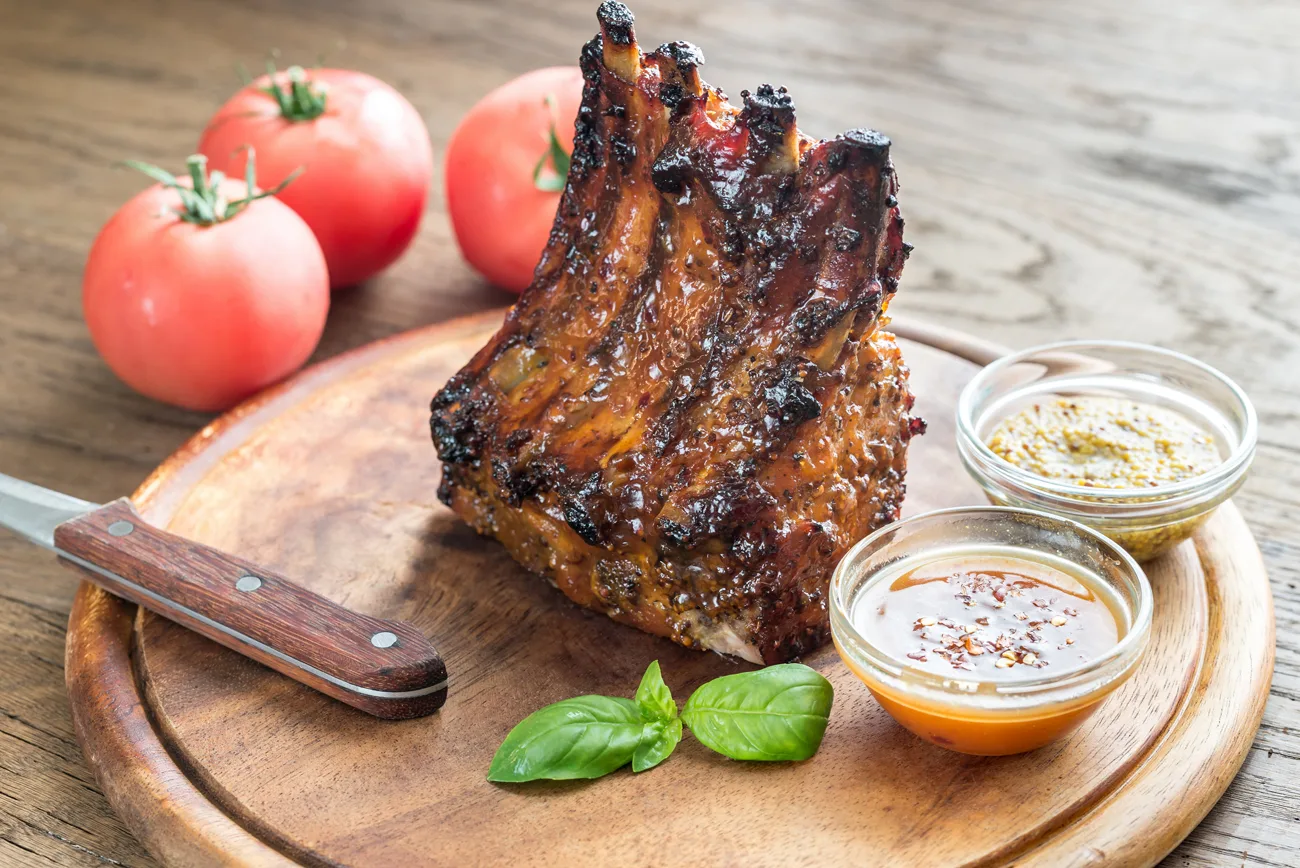Just like the pork shoulder vs. pork butt, parchment paper vs. butcher paper, and the shoulder roast vs. chuck roast debates, there is also a debate about mustard.
I know what you are thinking, a debate about mustard. Seriously, it’s just mustard!
There are more important things to argue about than mustard. However, mustard plays an integral role in the BBQ process, especially if you are making things such as ribs.
While others dispute the role of mustard in the BBQ process, some people use it to help the dry BBQ rub stick to the meat better.
Nevertheless, mustard will not impart any flavor to the ribs, so there’s no need to worry about ruining your precious ribs.
Contents
Why Do You Put Mustard on Ribs
Binders are to barbeque as brisket is to smoking in an offset smoker. Yes, the purpose of using mustard is to bind seasoning to the meat.
However, most people use mustard because it is an inexpensive vinegar-based product that is easily accessible.
In fact, you’ve probably got a bottle of mustard sitting in your fridge right now.
If you were to use olive oil to coat your ribs before applying the BBQ rub, it would take at least 1/4-1/2 cup to
Substitutes For Mustard
Even though mustard is the go-to binder of many barbecuers, there are some alternatives you can use.
These mustard alternatives work in the same way as mustard.
When the liquids evaporate, the soluble ingredients or the seasoning will remain.
Water
A dry rub is a rub made using dehydrated spices. Using water as a binder can help rehydrate the spices.
However, it will also allow the seasonings to penetrate the meat.
Technically, dry brining does the same thing. However, dry brining can take 1-3 hours. Dry brining works via osmosis.
For example, when you add salt to meat, the moisture is pulled out of it.
Because salt is a soluble substance, it dissolves in the meat’s juices and creates a concentrated, flavorful brine.
Essentially, salt consists of sodium and chloride ions that have electrical charges.
The ions battle the proteins until the muscle fibers relax and the brine is absorbed back into the meat. Even though the water method is cheaper than the mustard method, some people do not have access to clean water.
Therefore, you should stick with mustard if you do not have clean water.
Worcestershire Sauce
Worcestershire sauce is meant to be used on beef ribs. It is rare to see Worcestershire sauce used on pork ribs.
Worcestershire sauce enhances beef flavor, so it is the perfect binder for brisket, chuck roasts, rib roasts, and beef ribs.
Nevertheless, Worcestershire sauce can still be used for pork ribs. Worcestershire sauce contains some of the same ingredients that BBQ rubs due.
For example, molasses, distilled white vinegar, sugar, water, salt, and garlic can both be found in BBQ rubs and Worcestershire sauce.
If you are worried about the vinegar and water in the Worcestershire sauce, it will burn off as the meat cooks.
Even if your meat has spicy or sweet tones from the chili pepper or sugar in the sauce, it will only enhance the flavor of the meat.
Oil
Nearly every house on the planet has some type of oil, whether it be olive, canola, or vegetable oil.
You can use olive oil to slather the meat before adding the BBQ rub to it.
If you are going to use oil as a binder, do not use olive oil. Olive oil costs more, so it’s best to stick with vegetable or canola oil.
Apple Cider Vinegar or Apple Juice
Both apple cider and apple juice are common ingredients used with pork products.
For example, it is common to add apple juice when wrapping your meat with butcher paper since it pairs so well with pork.
If you are going to use apple juice when wrapping your pork, why not use it as a binder? It will only give the pork a stronger apple flavor.
Alternatively, you can also use a solution of apple cider vinegar and water as a binder.
People usually use this concoction to spritz the meat several times throughout the smoking process to prevent the bark from drying out.
However, you can also use water and apple cider vinegar as a binder.
Hot Sauce
Hot sauce can also be used as a binder. Best of all, most hot sauce brands are pretty inexpensive, so they are the perfect substitute for mustard if you want to add a slightly spicy flavor to your meat.
Most hot sauce contains some form of peppers such as cayenne peppers, vinegar, water, or salt.
The hot sauce will not give your meat a vinegary flavor as it burns off during the cooking process.
You will be left with spicy tones from the peppers. Suppose you do not like spice, it’s best to use one of the other binders.
Mayonnaise
I know what you’re thinking: mayonnaise as a binder. No way! Believe it or not, mayonnaise can be used as a binder.
It has a relatively neutral flavor; therefore, it will not drastically impact the flavor of the meat.
Should I Apply Mustard After the Dry Rub?
Most people apply the mustard before adding the dry rub. However, there are some people that add the dry rub before adding the mustard.
Either way, the dry rub will stick to the meat, so there is does not matter whether you add the mustard before or after the dry rub.
Final Thoughts
The concept behind adding mustard to ribs is to create a surface the dry rub can stick to.
Although some people do not use binders, they will quickly find out how hard it is for the dry rub to adhere to the meat.
You will have to let the ribs sit for a few hours or overnight for the rub to fully penetrate the meat.
Mustard is hands down the best binder, but it is not the only binder.
Nevertheless, you should apply the mustard and BBQ rub to your ribs a few hours before firing up your propane smoker and cooking the ribs.

I have been smoking and grilling meat from an early age and enjoy sharing my knowledge and expertise through the hundreds of articles I have written about BBQ. I hope to make everyone’s BBQ journey that little bit easier.

